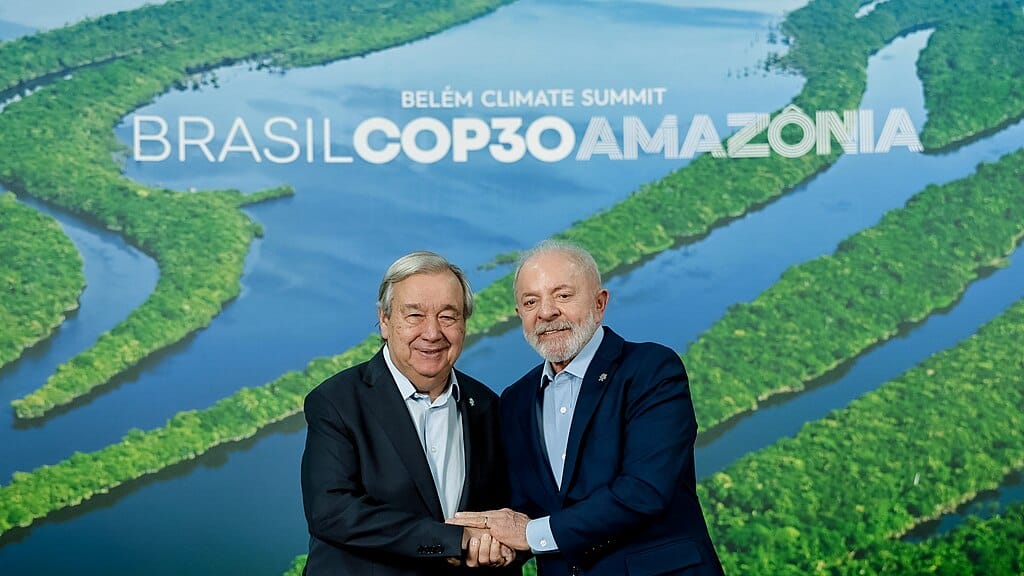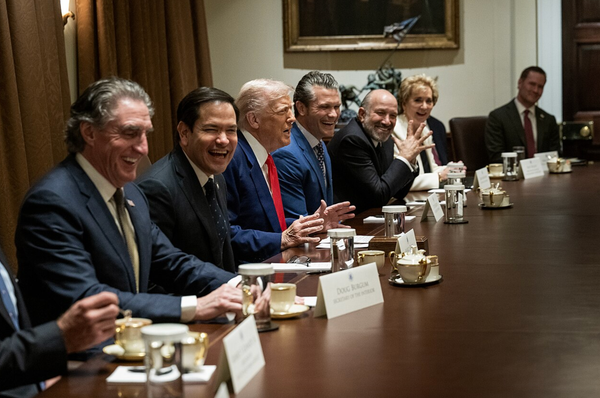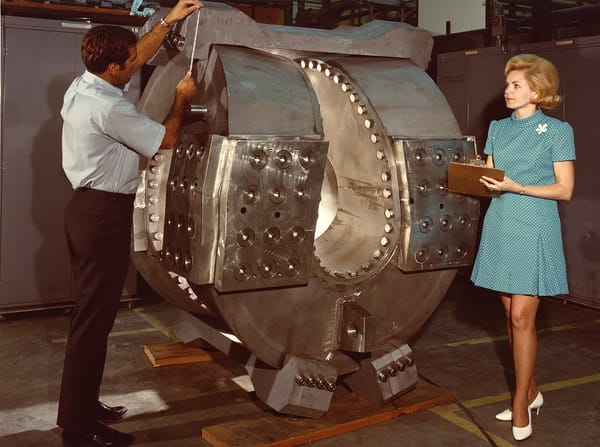What Good Are UN Climate Talks Knee-Deep in Oil?
Some new analysis from activists sheds some light on just how deep into the international climate negotiations process Big Oil has managed to burrow.

Three years ago, under an absurdly hot sun in Egypt, a climate activist told me that the UN climate conference "should not be a fossil fuel trade show." Having been to a number of previous COPs, as they are known, he said COP27 in Sharm El-Sheikh felt different thanks to "the palpable presence of the oil and gas lobby."
He wasn't wrong, but he also was a bit early. Some new analysis from activists sheds some light on just how deep into the international climate negotiations process Big Oil has managed to burrow; with COP30 now under way in Belém, Brazil, that penetration is now again on full display.
The numbers, by way of the Kick Big Polluters Out coalition: between COP26 in 2021 in Glasgow and COP29 last year in Baku, a minimum of 5,368 fossil fuel lobbyists graced the conferences' halls. That first year in Scotland saw 503 such lobbyists in attendance; the following year in Egypt, the number grew to 636. And then it exploded: in Dubai in 2023, easily the biggest COP yet with close to 100,000 attendees, 2,456 of them had fossil fuel connections. In 2024 the conference in general shrunk down some, likely thanks to Azerbaijan not quite offering the same international appeal as Dubai, but 1,773 fossil fuel lobbyists still showed up.
Please consider a paid subscription, or leave me a tip to support this work. Thank you!
This was not, to most people, much of a surprise. From the beginning, holding the world's most important climate change conference in functional petrostates never seemed like a particularly good idea. Egypt is the 27th-biggest oil producer in the world, and 20th-biggest fossil gas producer; a year later in the UAE, the host's ranks for those are eight and ten, respectively. The UAE even put the head of the Abu Dhabi National Oil Company in charge of the COP. Azerbaijan's absolute rankings are a bit lower (24th and 31st), but it gets north of 90 percent of all export revenue from oil and gas. They installed the country's energy minister as COP president.
What does it mean to have so much oil money and personnel present at the ostensible attempt to stop burning the stuff? Because that's what the COPs are, at root — they only managed to admit a "transition away" from fossil fuels was the goal two years ago, but that is, without a doubt, the entire point. Burning fossil fuels is why COPs need to exist; stopping burning them would represent the conferences' success.
But it's a hard question to answer: would we be further along, globally speaking, if the UN process had somehow incorporated a mechanism for simply banning fossil fuel companies from the room? Probably. I have covered a lot of cancer research conferences too, and I never saw a Philip Morris exec raising his hand during a presentation.
The counterargument is that we have, in fact, made progress. That eventual agreement after only 28 tries to put in writing that a transition away from fossil fuel use is a good idea occurred in Dubai, under the guidance of that oil executive and the watchful eye of almost 2,500 oil lackeys. The year before, when I was there in Egypt, countries agreed for the first time on a loss-and-damage fund, intended to have rich, polluting countries pay what are essentially reparations to the poor places suffering the consequences of 200 years of largely unchecked greenhouse gas emissions.
But the progress remains tepid, and riddled with loopholes. The full text of that little corner of the Dubai agreement read:
"Transitioning away from fossil fuels in energy systems, in a just, orderly and equitable manner, accelerating action in this critical decade, so as to achieve net zero by 2050 in keeping with the science."
A few lines later, a gift to the lobbyists:
"Recognizes that transitional fuels can play a role in facilitating the energy transition while ensuring energy security."
"Transitional fuels," of course, are a reference primarily to fossil gas — the thing the UAE produces more of than all but nine countries. (For the record, the US is first in both oil and gas production. USA! USA!) That loss-and-damage fund created in Sharm El-Sheikh was then "operationalized" a year later, but the first actual call for funding requests just went out today in Brazil; the fund so far contains under $400 million, with just over $700 million in pledges as of January. Damage costs just this year may already approach $1 trillion.
Big Oil's presence at the COPs well into the Paris Agreement era is less about them trying to reverse or dramatically halt the progress and more about throwing just enough sand in the gears to slow it up. Maybe the milestones happen sooner without them around; maybe the wording has more teeth, the funds have a few more dollars.
"Too many corporations are making record profits from climate devastation – with billions spent on lobbying, deceiving the public and obstructing progress," said UN Secretary-General António Guterres in his opening address in Brazil this week. "No more greenwashing. No loopholes."
And hey, maybe Belém can be a turning point. It has the distinction of not being an authoritarian petrostate, a welcome change from the last few hosts; and in fact the protests that have been largely muted in recent years have popped back up this week, at least to some extent.
Or... maybe not. Though it isn't necessarily known as such, Brazil too is a top-ten oil producing country. A report on Wednesday from Transparency International found that more than half — 54 percent — of all the country delegates registered for COP30 either did not disclose their affiliation or used nebulous options like "guest" or "other." Several major emitting nations including Russia and Mexico didn't list any affiliations at all. We do know that actual country delegations (as opposed to observers or other attendees) often have included fossil fuel reps — the UAE's delegation in Egypt had at least 70 of them, while Canada's has included pipeline company Enbridge execs, just for example — but what better way to weasel your dirty message into the proceedings than by failing to mention its origin story?
Plenty of people have decried the UN negotiations process over the years, but it remains the only version of international climate cooperation we've got. Australia is currently fighting with Turkey over who gets to host next year — the former has certainly not been much of a climate champion in the past, and is still the fourth-biggest producer of coal in the world, but it also just announced that it had built so much solar power that it will give away three hours of free electricity to millions of customers every day. The following COP is already set for Ethiopia, a large and growing country whose cumulative historic emissions — meaning, all of it, forever — belch forth from the US about once a month.
Perhaps extricating the process from the maw of the petrostate will bear fruit — or perhaps the lobbyists have settled comfortably into a groove, giddily ticking off "other" on a form and sitting in the shadows at the side of the room until it is time to whisper "gradual" to the people negotiating the consensus agreement's word choice. We can't prove a counterfactual — where the emissions ledger and the global thermostat would be without the oil ghouls in attendance — but it seems hard to imagine that we'd be worse off than we are.




